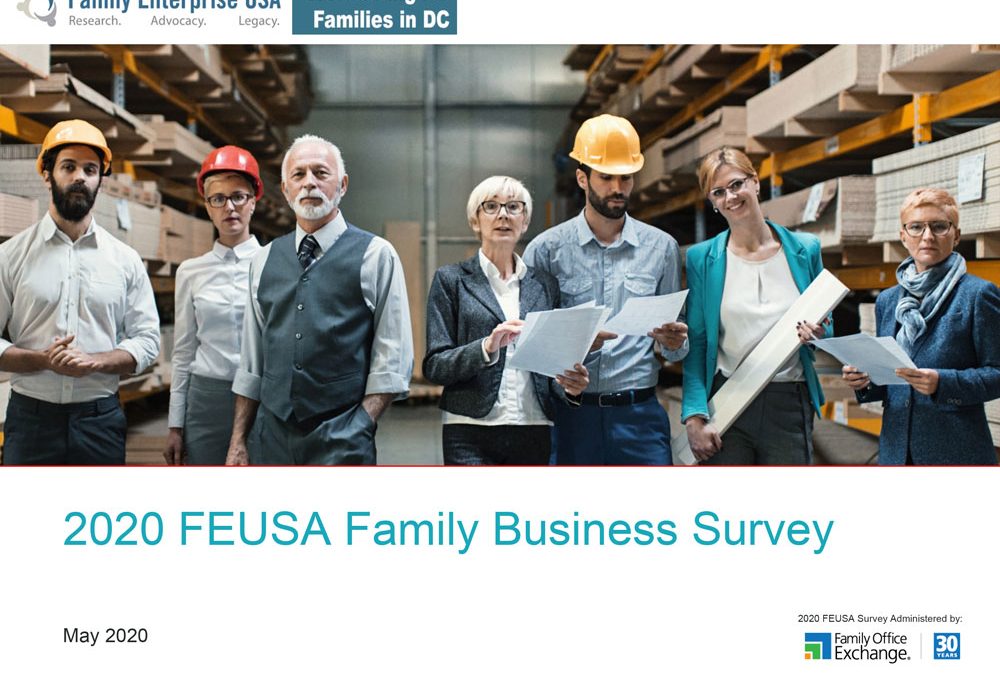A recent survey, the 2020 Family Enterprise USA Family Business Survey of family businesses (conducted between late and January and mid-April of this year), found that they’re remaining somewhat optimistic about their future despite an unprecedented first quarter due to the COVID-19 pandemic.
It’s important to keep in mind that some of these expectations may have already shifted as we now enter the second half of the year with new cases of the disease raging out of control throughout parts of the United States. Because the industry believes that the Tax Cuts and Jobs Act of 2017 did little to help the many family-owned companies organized as “pass through” businesses, such as Sub S corporations, limited liability companies, limited partnerships and sole proprietorships, who pay individual rather than corporate tax rates, the survey also found that income tax policy remains of key concern for these business owners.
The majority of the respondents are either sole or majority owners of a business, 84% of said businesses being in operation for 30 years or longer and 82% being companies with 2019 gross U.S. revenues of $6 million or more. The top three industries of these businesses are manufacturing; real estate; and construction, machinery and homes. More than half of the businesses have 100-plus employees.
Job Forecast
When asked about their plans to add new jobs, 63% plan to add between one and 50 new employees over the next five years, with the remaining 37% intending to add anywhere between 51 and upwards of 500 new jobs. Though the 50 or less category saw a drop of 12% from the number of actual jobs added the year prior, it seems that the commitment by these family businesses to continue to add jobs remains in place despite the current state of our economy. Some of the obstacles to job creation voiced by the respondents include economic uncertainty, finding qualified workers and high costs of a new hire.
Growth Outlook
The job predictions are correlated with the data showing that 79% of these businesses saw revenue growth in 2019. However, it once again needs to be underscored that even though revenue expectations for 2020 almost equally parallel those seen in 2019, uncertainty has started to creep in. Fewer business owners this year report they’re “very confident” in their ability to increase revenue each year—26% report as such now versus 33% reporting similarly last year. And, for the 16% who don’t expect revenue to grow in 2020, the top reported reason is the impact of COVID-19.
Not surprisingly, a majority of respondents believe that the biggest impediment to growth is a recession or market downturn, driven largely by COVID-19. Other potential impediments include cost of labor, the virus itself and tariffs/trade restrictions.
Tax Policy Concerns
In their fight to stay viable during this unprecedented time, these family businesses are primarily concerned about the need to reduce: (1) income tax, (2) estate tax and (3) government regulation, in that order. Income tax policy is of key concern for business owners. To be more precise, 71% of participants rank income tax as a top tax policy concern, and 46% rate estate tax as a top tax concern. Sixty-seven percent of respondents said they support reducing the rate of the estate tax, and 64% support repealing it altogether, while 57% would like to at least make the current exemption level permanent and 53% would like to see it increase.
To put it in their own words, one respondent said, “50% of my time in [the] past 5 years has literally been dedicated to estate planning and/or settlement of estates. I am not an attorney, I am an owner. Valuable time and money has been taken away from productivity and growth of our company. After income, capital gains, property and payroll taxes, one has to wonder if the U.S. [government] wants us to succeed. And if we don’t succeed, there will be no taxes paid at all.” Eighteen percent flat out said that they would have added more jobs if not for having to plan for estate taxes.
In addition, family businesses give 77% of their charitable giving to their local philanthropic community and only 23% nationally, illustrating a direct spillover community effect if the family business must be closed or sold.
COVID-19 Uncertainty
When asked whether the recent uptick in new cases across the country and the United States’ failure to contain the virus might have prompted a different outlook from respondents, Patricia M. Soldano, president of Family Enterprise USA, said “Family Enterprise USA’s 2020 survey of U.S. family business owners tells us that while family businesses continue to grow and thrive, it’s not clear how the Covid-19 pandemic will affect these companies’ long term. Still, many respondents are confident about the ability to grow their businesses. They stay committed to their employees, paying higher wages and better benefits than their nonfamily competitors, and to their local philanthropic communities, who receive 77% of the money family businesses allocate to charitable causes. While the continuation of the pandemic will affect family businesses, they plan for the long term and build their businesses as a legacy for the family, the employees and their communities, and are resilient.”
Family Enterprise USA is the organization that represents all family businesses on a national level in DC; it is not unique to any industry. FEUSA is different from other organizations because it represents and advocates for the families of family businesses and the issues, they face running their businesses every day. Our sole mission and purpose is to promote family businesses and their job growth in America. We also support the work of Family Business Centers across the country. We hope your family will choose to be a member of FEUSA. Family Enterprise USA is a 501(c)(3) non-profit organization. Family foundations can donate.

